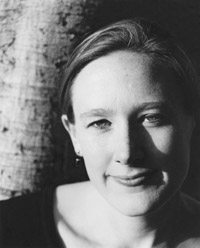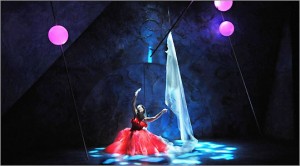Playwright Ruhl Begins Residency at Wesleyan

MacArthur award winner Sarah Ruhl begins a two-day residency at Wesleyan on Feb. 10, the fifth by a playwright in the university’s “Outside the Box” theater series, which brings distinguished playwrights to campus.
Ruhl, a two-time finalist for the Pulitzer Prize and author of the widely praised “Euridyce, ” “The Clean House,” and “In the Next Room (or the vibrator play),” among other works, has been described by The New York Times as “among the most acclaimed and accomplished young playwrights on the contemporary scene.”
At Wesleyan she will visit an acting class, dine with both playwriting students and faculty from several departments,and talk about her work in a 90-minute public appearance.
Ruhl also will meet with visiting director Micahel Rau ’05 and the cast of his upcoming production of her work “Melancholy Play,” a farce. It will be staged at Wesleyan’s CFA Theater from Feb. 24 to 26.

“Outside the Box” is a joint program of the theater department and the Center for the Arts. Playwrights Charles Mee, Moises Kaufman, Tony Kushner and David Henry Hwang have previously been in residence at Wesleyan.
“Sara Ruhl’s stay on campus promises to be a very intense experience,” says Claudia Tatinge Nascimento, associate professor of theater and department chair. “She is a most important voice in American contemporary theater and it is an honor to have her at Wesleyan.”
Tatinge Nascimento called Ruhl’s residency a “one-of-a-kind opportunity for Wesleyan students to learn more about the different creative processes, artistic stances, and the ideological positions of groundbreaking writers.”
Ruhl won a MacArthur “genius” grant in 2006 – a year after she was a finalist for a Pulitzer Prize for “The Clean House.” Her latest play, “In the Next Room (or the vibrator play)” was nominated for a best play Tony Award last year, and was also a Pulitzer finalist.
Ruhl’s Feb. 10 talk is scheduled for 8 p.m. at Memorial Chapel. She will be introduced by David Jaffe, the Frank B. Weeks Visiting Professor of Theater. The talk is open to the public free of charge.
Wesleyan’s English Department, the Little Fund and the Wesleyan Writing Program are all co-sponsors of Ruhl’s visit.

